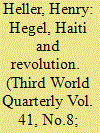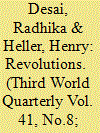| Srl | Item |
| 1 |
ID:
173445


|
|
|
|
|
| Summary/Abstract |
Susan Buck-Morss’s argument that the Haitian Revolution embodied the most universal aspect of the French Revolution, namely the quest for universal freedom, relies on the supposed references to Haiti in the master–slave dialogue in Hegel’s Phenomenology of Spirit. The revolution’s lodgement at the core of this foundational text of Enlightenment universalism is, for her, about as convincing a demonstration as one can have of the universal significance of the Haitian Revolution. Marxists have opposed her venture, and demonstrated their hostility to post-colonial thinking, principally by claiming that the master–slave is an expression of European class conflict. This paper agrees with Buck-Morss that the Haitian Revolution critically affirmed the principle of universal freedom and, indeed, pushed the revolution in France and Europe in a radical direction. A better affirmation of the universal significance of the Haitian Revolution than the thoughts of Hegel is possible. The latter do not actually provide such affirmation, because racism, Eurocentrism and a hostility to political radicalism are fundamental aspects of Hegel’s thought. The alternative affirmation can be found in Marxist analysis. This paper outlines such an analysis, and concludes that post-colonialism of Buck-Morss’s sort is no substitute for the perspective provided by historical materialism.
|
|
|
|
|
|
|
|
|
|
|
|
|
|
|
|
| 2 |
ID:
173434


|
|
|
|
|
| Summary/Abstract |
We held the ‘Revolutions’ conference in 2017 to commemorate the Russian Revolution and redeem the actual record of revolutions in the Third World for the left. A quarter-century after the demise of the USSR, we found liberal capitalist triumphalism unwarranted. Two of the most important expectations to which it gave rise – that the world had become ‘unipolar’ and that it would enjoy a ‘peace dividend’ – remained unfulfilled. Instead, the world became multipolar and the West, led by the United States, engaged in unprecedented economic and military aggression against countries that contested its power. If this were not enough, social unrest and explosions in the First World as well as the Third underlined the relevance of revolutions. To trace their lineage, we recall capitalism’s intimate relation with revolution. It has needed revolutions to usher it into history and to usher it out. In addition to revolutions against developed capitalism, we also underline how important and necessary revolutions against nascent capitalism in various parts of the world have been. The contributions in this volume explore different parts of this lineage and vivify revolutions for our time.
|
|
|
|
|
|
|
|
|
|
|
|
|
|
|
|